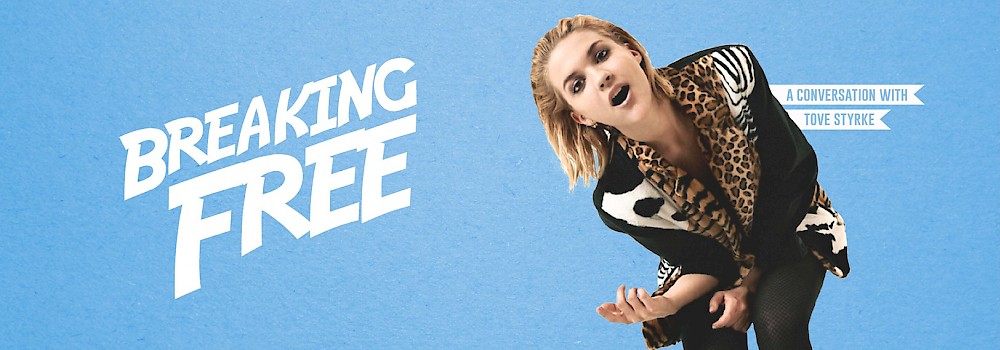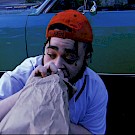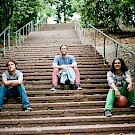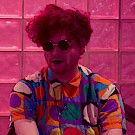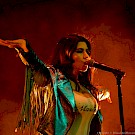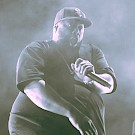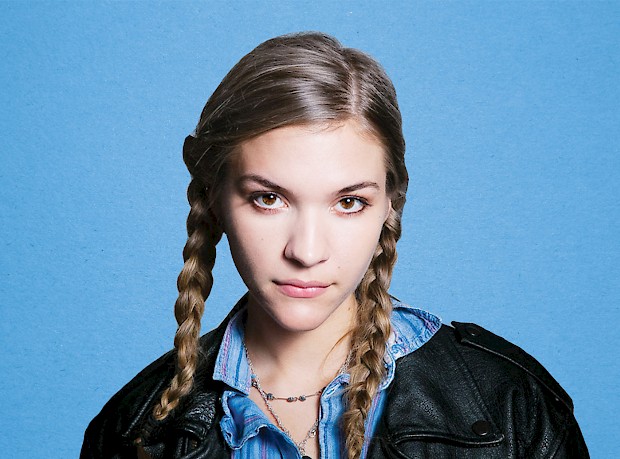
It's time for America to get familiar with Tove Styrke.
Following a third place finish on Swedish Idol as a 16-year-old (an experience she’s openly described as “a pretty weird way to get into music”), Styrke’s 2010 self-titled debut was well received in her home country, spending 35 weeks on Sweden's top album charts. Encouraged by commercial success but weary of the life she'd been thrown into as a teenager, Styrke wisely took advantage of post-album downtime and retreated to her hometown of Umeå for a break from the industry—with hopes of finding herself as both a songwriter and an adult.
The decision paid off. The release of her Borderline EP in late 2014 signaled the emergence of a defiant new sound. With the same accessible pop sensibilities that made her debut so irresistible, Styrke’s new songs are propelled by the contagious spirit of a young woman breaking free from long-standing cultural, political and geographic borders.
Weaving together upbeat sonic influences including '90s pop, reggae and modern electropop, Styrke’s music radiates an infectious, carefree energy—nicely balancing the weighty social message of female independence and empowerment that guides her lyrics. It’s the kind of music that perfectly soundtracks summertime road trips to the beach, while slipping in commentary that’ll stay on your mind long after you return home.
With a recent appearance on Late Night with Seth Meyers and the music video for “Borderline” nearing one million views, it appears Styrke’s music is finally taking off outside the borders of Sweden. As she prepared for the June release of her sophomore album, Kiddo, and put the last pieces in place before leaving on her first US tour (see her in Portland at the Doug Fir on Monday, May 18), we couldn’t pass up the chance to speak with the exciting young artist.
I was introduced to you through the music video for "Borderline," which was shot in some really cool locations around Svalbard, Norway. Where'd you get the idea to visit an old Soviet Union ghost town?
Tove Styrke: We actually found it on the internet by accident. We were Googling for something else when that place, Pyramiden, came up. We were blown away and decided to go there instead. It seemed like it would be an adventure—and it really was.
What about those locations seemed to fit a song like "Borderline"?
I liked the idea of going to Svalbard [an archipelago of islands far north in the Arctic Ocean] because it's a very remote place. It's kind of isolated from the rest of the world and I wanted to get a sense of breaking free and breaking away. In the video we were exploring this place and I thought it was really nice that we were actually exploring it in real life for the first time as well. I think that adds a nice layer to it. I also thought the scenery in Svalbard was the perfect backdrop for the track. It's very rough and raw—but still beautiful, epic and grand.
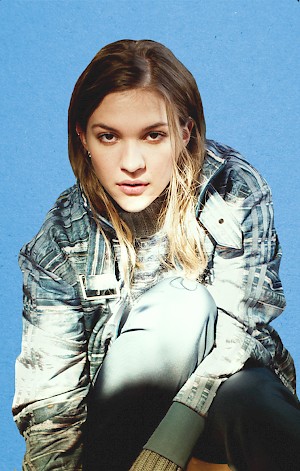 I was just reading your Twitter bio, which says, "I RhymeZone and sing it." I laughed when I saw that because it's probably a pretty accurate job description for a lot of pop artists, but your lyrics seem to be a little more than just stringing together pretty words that rhyme and singing them. I was wondering what's been inspiring you lyrically recently?
I was just reading your Twitter bio, which says, "I RhymeZone and sing it." I laughed when I saw that because it's probably a pretty accurate job description for a lot of pop artists, but your lyrics seem to be a little more than just stringing together pretty words that rhyme and singing them. I was wondering what's been inspiring you lyrically recently?
[Laughs] Yeah, I write about a lot of things. The initial idea can come from very different places. It can come from a movie—or it can be a feeling, which is often frustration and anger from something that I need to deal with or cope with. That's a great thing that you can do when you're making music. It's a good way to cope with your emotions. I like writing in a rhythmic way too. I focus a lot on the rhythm and the flow of the lyric, then I put a melody to it. I also like taking big subjects and complicated problems and translating them into pop lyrics. That's a really fun process for me.
It seems like you started out as more of a vocalist and got into writing later. When did you figure out writing was something you wanted to do too?
I discovered that I could write my own songs when I was working on my first album in 2010. That record was a lot about learning: both about the industry and songwriting. It was about trying different things and working with different people. With this album, Kiddo, I feel like I've had a more solid foundation to build upon. I know more now and have a vision of what I want to do. I have things musically that I want to explore, both with the sound and the lyrics. My writing has really grown with me.
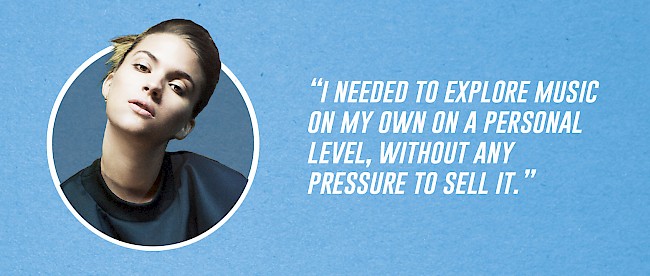
After the whole whirlwind of Swedish Idol and the release of your debut album, you took some time off from music. How do you think that pause in your career affected the new songs?
That break was very important to me. I took some time away and went back to my hometown of Umeå, which is up in northern Sweden. I needed some time away from the music industry, I think. I needed to put some distance between it and me. I needed to explore music on my own on a personal level, without any pressure to sell it. I also needed to get to know myself as a grown up. I wanted to reach a new level with my writing. I wanted to dare to put myself into the lyrics in a different way, because it's one thing to write a lyric that sounds good and rhymes—but it's a completely different thing to write a lyric that sounds good and rhymes and actually comes from some place real. That can be scary, but that's something that I really wanted to do with this record.

It sounds like it would be difficult to write songs that are true to yourself while still pleasing a major label that's looking for commercial success. How have you managed to balance that?
For me, it's not much of a struggle because I love pop music. I like making pop songs and my label and I have always had a very good relationship. Since day one, we've always worked very well together. They've always let me do my own thing, especially now. We work together. I don't want to sound bossy or anything, but sometimes it's like they work for me, actually. I set the agenda. We're always on the same page. But like I said, I really like to write pop songs because to me one of the most interesting things is making the music as direct and simple to understand as possible.
There's a line in "Walking a Line" that I really like, which goes, "Hijack the idea of a girl who obeys," followed by an awesome and kind of crazy laugh. Where'd that come from?
[Laughs] Yeah! That's actually one of my favorite lines! That just came to me. I was seriously just walking in the street and that rhythm just came to me [sings: "hijack - the - idea - of - a - girl - who - obeys - ha - ha - ha - ha"]. I had seen this old Catwoman movie where she was a little on the crazy side. Not the Halle Berry version, but an earlier one from the '80s or '90s where she's that sort of hysterical that people often try to use against women. Where people go, "Oh, no, you're crazy. You're just being hysterical." People sometimes use our emotions against us because we're women. We're not taken seriously, really, and I felt inspired to take something out of that frustration.
Feminism is a theme that runs through a lot of your music and there's been a lot of debate recently about the definition of that word. What does it mean to you? Do you identify as a feminist?
Yes, I identify as a feminist. I think the idea that men and women aren't equal is wrong and I want to change that. We're living in a patriarchal world and I want to do something about that. We should be treated equal, but we're not. There's no question to me whether I'd call myself a feminist or not. I'll always do that because I have so much to thank feminists throughout the ages for: for so much that I have and for so much of my freedom. So yeah, there's no question in the matter of calling myself that.
You've talked about some of your musical influences before, including M.I.A., Björk and Kate Bush. What are some of your non-musical influences?
I often get a picture in my head, like a scene from a movie, and then I try to put music to that picture. So, sometimes I write like that. I also get very inspired by movies. Kill Bill was a big inspiration in the beginning of the creative process of Kiddo.
When you think about what's to come over the next six months or so, what are you most excited about?
I'm really excited for this US tour that's starting next week. It's my first tour in America and we're going in a bus from coast to coast. I'm really looking forward to that. And also releasing the album in June because I've been working on it for more than two years now and I'm really excited about putting it out there!

